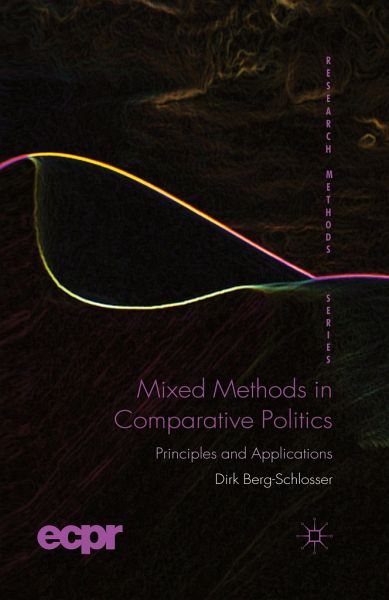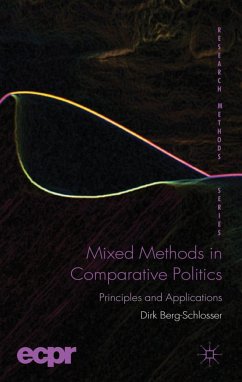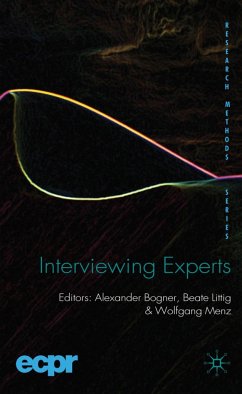
Versandkostenfrei!
Versandfertig in 6-10 Tagen
Weitere Ausgaben:

PAYBACK Punkte
19 °P sammeln!





This book approaches current controversies concerning qualitative and quantitative procedures in the social sciences and incorporates new methods showing how they can supplement each other. It is based on a comprehensive international research project that readers can apply to their findings through the data set provided on the author's home page.
DIRK BERG-SCHLOSSER is Professor of Political Science at the Institute of Political Science, Philipps University, Germany. He was Chair of the European Consortium for Political Research (ECPR) 2003-2006 and Vice-President of the International Political Science Association (IPSA) 2006-2009. His previous publications include The Conditions of Democracy in Europe 1919-39: Systematic Case Studies and Authoritarianism and Democracy in Europe, 1919-39: Comparative Analyses.
Produktdetails
- ECPR Research Methods Series
- Verlag: Palgrave Macmillan / Palgrave Macmillan UK / Springer Palgrave Macmillan
- Artikelnr. des Verlages: 978-1-349-34844-2
- 1st ed. 2012
- Seitenzahl: 260
- Erscheinungstermin: 1. Januar 2012
- Englisch
- Abmessung: 216mm x 140mm x 15mm
- Gewicht: 332g
- ISBN-13: 9781349348442
- ISBN-10: 1349348449
- Artikelnr.: 45069363
Herstellerkennzeichnung
Macmillan Education
Tiergartenstr. 17
69121 Heidelberg
ProductSafety@springernature.com
'A central issue in the social sciences today is how to combine different analytic methods and accomplish effective multi-method research. In Mixed Methods in Comparative Research, Dirk Berg-Schlosser provides an exemplary demonstration of mixed methods research focused on a specific substantive question the survival/breakdown of democracy in inter-war Europe. He shows how to establish a rich dialogue between within-case analysis and configurational cross-case analysis, providing an important methodological template for future research.'
Charles Ragin, Chancellor's Professor, University of California, Irvine
'Building on his large experience as a first rate comparativist, Dirk Berg-Schlosser provides a coherent, systematic
Charles Ragin, Chancellor's Professor, University of California, Irvine
'Building on his large experience as a first rate comparativist, Dirk Berg-Schlosser provides a coherent, systematic
Mehr anzeigen
account of challenges and problems anyone conducting comparative research has to cope with. For research based on small and medium numbers of cases, such as studies on democracy and democratization, public policies or similar topics Berg-Schlosser provides a compulsory reading for students and scholars. Their work will be substantially improved by reading this well written and neatly argued book.'
Leonardo Morlino, LUISS Rome
'I have a Wahlverwandtschaft with Berg-Schlosser because I share with him the openness to different theoretical approaches which some may define as eclecticism and his strong commitment to empirical testing: the confrontation of theories with the facts. The broader array of methodological tools heis ready to use reflects a generational change.'
Juan Linz, Yale University
Leonardo Morlino, LUISS Rome
'I have a Wahlverwandtschaft with Berg-Schlosser because I share with him the openness to different theoretical approaches which some may define as eclecticism and his strong commitment to empirical testing: the confrontation of theories with the facts. The broader array of methodological tools heis ready to use reflects a generational change.'
Juan Linz, Yale University
Schließen
Für dieses Produkt wurde noch keine Bewertung abgegeben. Wir würden uns sehr freuen, wenn du die erste Bewertung schreibst!
Eine Bewertung schreiben
Eine Bewertung schreiben
Andere Kunden interessierten sich für











